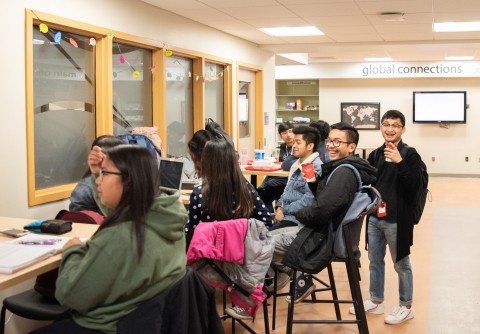
In 2017, an executive team led by Nancy Eze brought back the International Students’ Association, which represents and advocates for all international students at the University of Saskatchewan. Only a year later, the ISA has stopped their activities after no one attended their annual elections.
When planning the return of the ISA, Eze, fourth-year physiology and pharmacology student and former president of the ISA, was told by the International Student and Study Abroad Centre that past ISA executives had failed to keep the organization going after they graduated. Now, Eze and her team find themselves in the same situation, unable to find people to carry the organization forward.
Eze says that the lack of active participants has limited the ISA from the start.
“We had that first meeting, and a lot of people put in their ideas, but everyone that signed up, when we emailed them, said they weren’t interested. It was very disheartening,” Eze said. “A lot of international students don’t want to get involved in university politics because they come here paying so much [in tuition] that they just want to study. They feel like they don’t have time for it.”
María Celeste Nuñez, fourthyear environmental student and president of the U of S Latin American Students’ Association, says the lack of student interest in the ISA might have stemmed from miscommunications regarding their purpose.
“They called for a general assembly of all international students and invited us to participate and run for executives, but at the time, I didn’t really know what the group was about or why they were creating it,” Nuñez said. “Seeing a new student association that says they are going to represent all of us formed without much communication or collaboration probably diminished the effectiveness of the ISA.”
Nuñez says that international students would have a better communication system if organizations like the ISA sourced their leaders from existing executive teams.
“Making a new group and calling for anyone to be an executive member — there’s no clear pyramid of communication there,” Nuñez said. “If chosen leaders go to meetings, they can pass down information to their teams and then to their members — there are clear communication levels. It just creates a better structure than having a separate entity.”
A group with the organizational model that Nuñez suggests already exists in the ISSAC’s Global Connections Network, where representatives from international student groups as well as other cultural groups with an international focus meet to discuss topics that concern the international student body. Eze says that, in a situation where international students need advocacy, a separate entity specifically for international students such as the ISA would be more effective if they had the proper resources.
“ISSAC helps a lot, and people go to ISSAC, and from there, to their [academic] departments, but the university is such a big body that communications sometimes get lost,” Eze said. “We need student advocacy for better communication. We were hoping to bridge the gap between the university and international students. That is still the aim of the organization.” Nuñez agrees that keeping the organization going or starting over with a similar group would be beneficial for international students.
“A group like that is good because it gives strength to the international student body — I fully support their idea,” Nuñez said. “I believe the ISA had the best intentions, and their agenda was very beneficial. I understand that it’s just difficult.”
However, the ISA might still return to action. Eze is set to meet with Akinwande Akingbelin, international students’ representative for the University Students’ Council, to discuss the topic. Whatever the changes that might need to be made for the ISA to carry on, Eze is eager to see other students take charge of the association before she graduates.
“If anyone is interested in carrying on the legacy, they should contact me,” Eze said. “I had a vision for this association, but we need people to [bring] it to life. I just hope this organization carries on.”
—
Ana Cristina Camacho / Staff Writer
Photo: Riley Deacon / Photo Editor